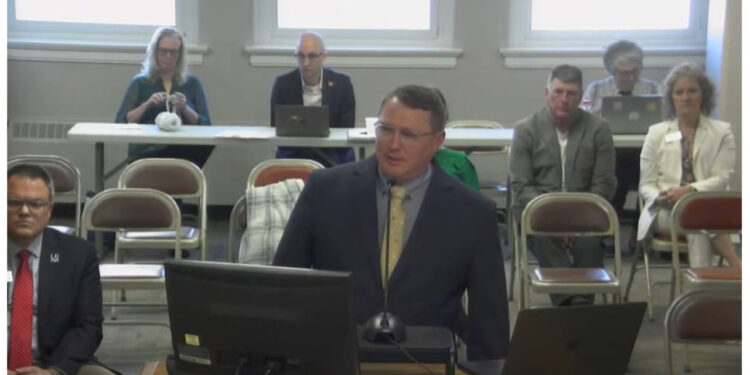During a Board of Education discussion on Tuesday, April 9, 2024, Alex Red Corn, a member of the Osage Nation in Oklahoma, shared insights on the progress of indigenous education. (Taken from a screenshot by Kansas Reflector, sourced from the Kansas State Board of Education’s YouTube channel.)
The Kansas State Board of Education made a decision on Tuesday to broaden the scope of indigenous education outreach, extending it from K-12 to the college level. This move comes after a discussion that delved into topics such as mascots and political agendas.
Members have voted 9-1 in favor of approving a memorandum of understanding (MOU) that will establish the Kansas Advisory Council for Indigenous Education. This MOU solidifies the partnership between the Kansas Board of Regents and the advisory council, allowing for ongoing consultation on matters concerning indigenous education in the state. The agreement was signed by the regents on March 21st.
Board member Jim Porter emphasized the importance of meaningful educational opportunities and engaging in conversations to foster better understanding among individuals. He highlighted the significance of such interactions in creating a positive impact.
The Kansas Advisory Council for Indigenous Education was established as a temporary committee with the aim of enhancing relationships with the state’s four Native nations and improving educational outcomes for indigenous children and youths. Dennis Hershberger, a board member, emphasized the importance of avoiding political animosity during discussions about the historical context before voting in favor of the proposal.
“I simply want to promote the teaching of accurate history, and if that’s the objective, then I commend that effort,” Hershberger expressed. “From a biblical perspective, we believe that everyone is created equal and it is crucial that we examine each individual with integrity and worth. Viewing history through this lens is of utmost importance.”
In 2022, Randy Watson, the Kansas commissioner of education, made comments during a virtual education conference. Now, two years later, the move is being made based on those comments.
At the time, Watson shared an amusing anecdote about his cousins from California who had a fear of tornadoes. He recalled how they would visit during the summer and express their concern about being killed by a tornado. Watson, in a lighthearted manner, reassured them by saying they didn’t need to worry about tornadoes, but rather about the possibility of Indians raiding the town. His cousins took his words seriously, highlighting their genuine belief in the fictional threat.
Watson expressed remorse for his remarks and faced a suspension of one month without receiving any salary.
During the Board of Education discussion on Tuesday, the council’s political impact was a topic of interest. Board member Danny Zeck, who was the sole “no” vote, directed his question to council member Alex Red Corn. Red Corn, a citizen of the Osage Nation in Oklahoma and an assistant professor at Kansas State University, was asked about his recommendations regarding mascots.
Zeck questioned if this is the same group that aims to eliminate all mascots.
In 2022, the council made a recommendation for the BOE to prioritize convincing local school officials to discontinue the use of culturally offensive branding.
According to a council memorandum, over 20 schools in Kansas still have mascots that depict American Indians. However, many tribes have voiced their opposition to these mascots, as they believe they contribute to the negative perception of indigenous people and perpetuate stereotypes that portray them as “exotic” and “warlike,” ultimately keeping them rooted in the past.
The group is currently focusing on analyzing student data and working on teacher certification, according to Red Corn.
According to Red Corn, mascots often receive more attention, but they are not a significant focus of their current efforts. Instead, they are shifting towards the concept of developing collaborative educational systems. The goal is to ensure that individuals have a thorough understanding of Kansas, its history, and how it has shaped the present.
The Kansas Board of Education has approved a plan to expand its outreach efforts in indigenous education. This decision reflects their commitment to promoting a more inclusive and comprehensive curriculum for students across the state. By incorporating indigenous education into the curriculum, the board aims to provide students with a deeper understanding and appreciation of Native American history, culture, and contributions. This initiative is a significant step towards fostering a more inclusive educational environment in Kansas.

